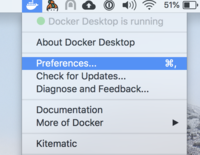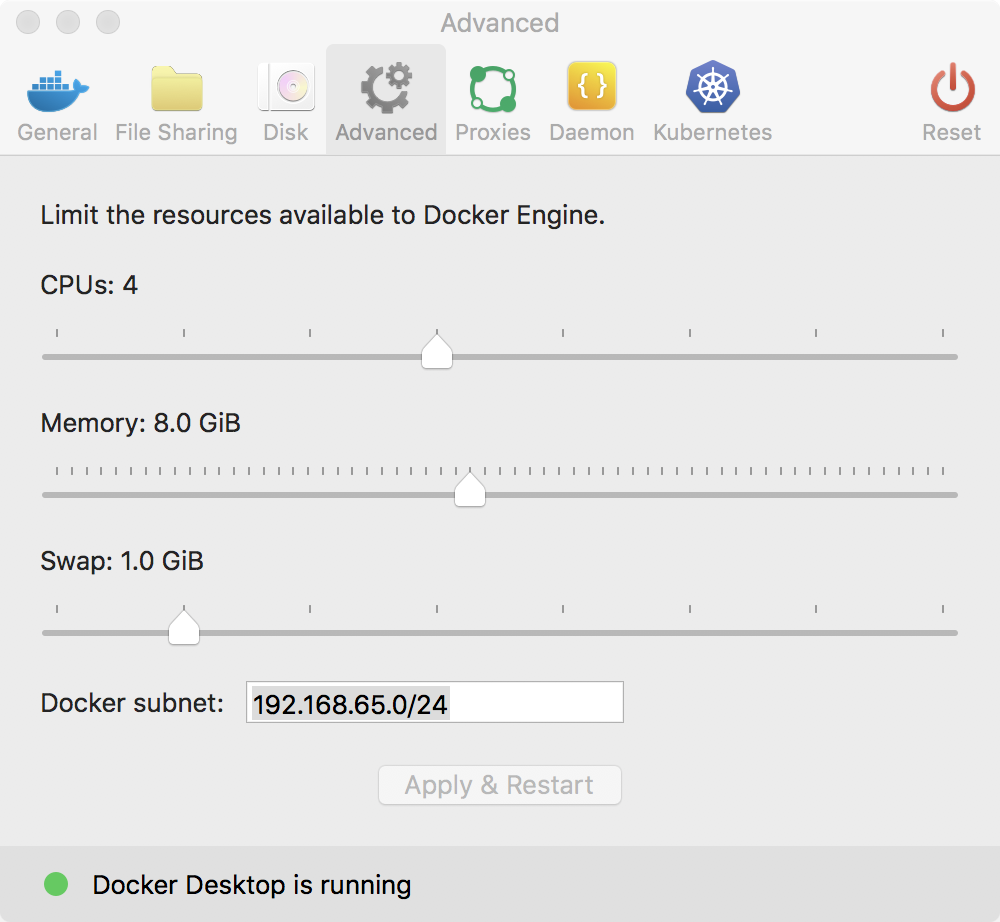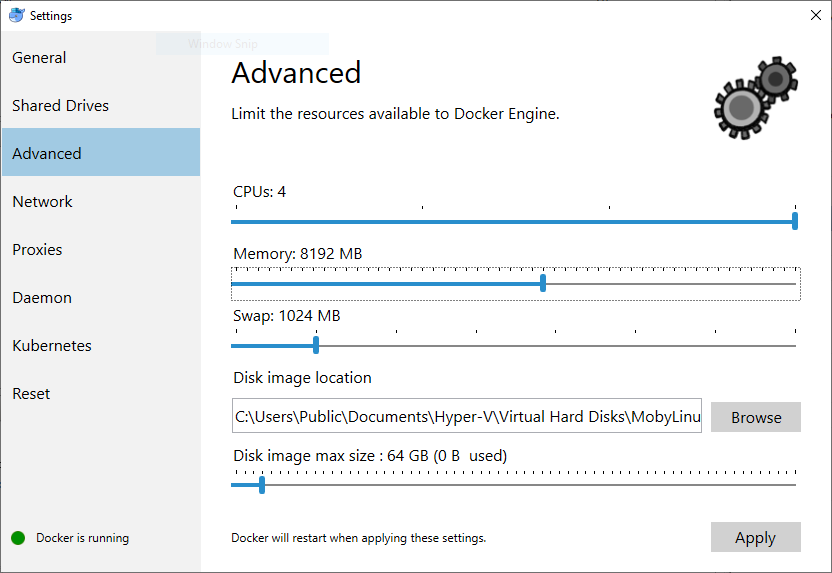Known Issues
Having problems with kind? This guide covers some known problems and solutions / workarounds.
It may additionally be helpful to:
- check our issue tracker
- file an issue (if there isn't one already)
- reach out and ask for help in #kind on the kubernetes slack
Contents 🔗︎
- Kubectl Version Skew (Kubernetes limits supported version skew)
- Older Docker Installations (untested, known to have bugs)
- Docker Installed With Snap (snap filesystem restrictions problematic)
- Failure to Build Node Image (usually need to increase resources)
- Failing to Properly Start Cluster (various causes)
- Pod Errors Due to “too many open files” (likely inotify limits which are not namespaced)
- Docker Permission Denied (ensure you have permission to use docker)
- Windows Containers (unsupported / infeasible)
- Non-AMD64 Architectures (images not pre-built yet)
- Unable to Pull Images (various)
- Chrome OS (unsupported)
- AppArmor (may break things, consider disabling)
- IPv6 Port Forwarding (docker doesn't seem to implement this correctly)
- Fedora 32 Firewalld (nftables + docker broken, switch to iptables)
- Couldn't find an alternative telinit implementation to spawn
Kubectl Version Skew 🔗︎
You may have problems interacting with your kind cluster if your client(s) are skewed too far from the kind node version. Kubernetes only supports limited skew between clients and the API server.
This is a issue that frequently occurs when running kind alongside Docker For Mac.
This problem is related to a bug in docker on macOS
If you see something like the following error message:
$ kubectl edit deploy -n kube-system kubernetes-dashboard
error: SchemaError(io.k8s.api.autoscaling.v2beta1.ExternalMetricStatus): invalid object doesn't have additional properties
You can check your client and server versions by running:
|
If there is a mismatch between the server and client versions, you should install a newer client version.
If you are using Mac, you can install kubectl via homebrew by running:
|
And overwrite the symlinks created by Docker For Mac by running:
|
Older Docker Installations 🔗︎
kind is known to have issues with Kubernetes 1.13 or lower when using Docker versions:
1.13.1(released January 2017)17.05.0-ce(released May 2017)
And possibly other old versions of Docker.
With these versions you must use Kubernetes >= 1.14, or more ideally upgrade Docker instead.
kind is tested with a recent stable docker-ce release.
Docker Installed with Snap 🔗︎
If you installed Docker with snap, it is likely that docker commands do not
have access to $TMPDIR. This may break some kind commands which depend
on using temp directories (kind build ...).
Currently a workaround for this is setting the TEMPDIR environment variable to
a directory snap does have access to when working with kind.
This can for example be some directory under $HOME.
Failure to build node image 🔗︎
Building kind's node image may fail due to running out of memory on Docker for Mac or Docker for Windows. See kind#229.
If you see something like this:
cmd/kube-scheduler
cmd/kube-proxy
/usr/local/go/pkg/tool/linux_amd64/link: signal: killed
!!! [0116 08:30:53] Call tree:
!!! [0116 08:30:53] 1: /go/src/k8s.io/kubernetes/hack/lib/golang.sh:614 kube::golang::build_some_binaries(...)
!!! [0116 08:30:53] 2: /go/src/k8s.io/kubernetes/hack/lib/golang.sh:758 kube::golang::build_binaries_for_platform(...)
!!! [0116 08:30:53] 3: hack/make-rules/build.sh:27 kube::golang::build_binaries(...)
!!! [0116 08:30:53] Call tree:
!!! [0116 08:30:53] 1: hack/make-rules/build.sh:27 kube::golang::build_binaries(...)
!!! [0116 08:30:53] Call tree:
!!! [0116 08:30:53] 1: hack/make-rules/build.sh:27 kube::golang::build_binaries(...)
make: *** [all] Error 1
Makefile:92: recipe for target 'all' failed
!!! [0116 08:30:54] Call tree:
!!! [0116 08:30:54] 1: build/../build/common.sh:518 kube::build::run_build_command_ex(...)
!!! [0116 08:30:54] 2: build/release-images.sh:38 kube::build::run_build_command(...)
make: *** [quick-release-images] Error 1
ERRO[08:30:54] Failed to build Kubernetes: failed to build images: exit status 2
Error: error building node image: failed to build kubernetes: failed to build images: exit status 2
Usage:
kind build node-image [flags]
Flags:
--base-image string name:tag of the base image to use for the build (default "kindest/base:v20181203-d055041")
-h, --help help for node-image
--image string name:tag of the resulting image to be built (default "kindest/node:latest")
--kube-root string Path to the Kubernetes source directory (if empty, the path is autodetected)
--type string build type, one of [bazel, docker] (default "docker")
Global Flags:
--loglevel string logrus log level [panic, fatal, error, warning, info, debug] (default "warning")
error building node image: failed to build kubernetes: failed to build images: exit status 2
Then you may try increasing the resource limits for the Docker engine on Mac or Windows.
It is recommended that you allocate at least 8GB of RAM to build Kubernetes.
Open the Preferences menu.

Go to the Advanced settings page, and change the settings there, see changing Docker's resource limits.


Failing to properly start cluster 🔗︎
This issue is similar to a failure while building the node image. If the cluster creation process was successful but you are unable to see any Kubernetes resources running, for example:
$ docker ps
CONTAINER ID IMAGE COMMAND CREATED STATUS PORTS NAMES
c0261f7512fd kindest/node:v1.12.2 "/usr/local/bin/entr…" About a minute ago Up About a minute 0.0.0.0:64907->64907/tcp kind-1-control-plane
$ docker exec -it c0261f7512fd /bin/sh
# docker ps -a
CONTAINER ID IMAGE COMMAND CREATED STATUS PORTS NAMES
#
or kubectl being unable to connect to the cluster,
$ kind export kubeconfig
$ kubectl cluster-info
To further debug and diagnose cluster problems, use 'kubectl cluster-info dump'.
Unable to connect to the server: EOF
Then as in kind#156, you may solve this issue by claiming back some space on your machine by removing unused data or images left by the Docker engine by running:
|
And / or:
|
You can verify the issue by exporting the logs (kind export logs) and looking
at the kubelet logs, which may have something like the following:
Dec 07 00:37:53 kind-1-control-plane kubelet[688]: I1207 00:37:53.229561 688 eviction_manager.go:340] eviction manager: must evict pod(s) to reclaim ephemeral-storage
Dec 07 00:37:53 kind-1-control-plane kubelet[688]: E1207 00:37:53.229638 688 eviction_manager.go:351] eviction manager: eviction thresholds have been met, but no pods are active to evict
Pod errors due to “too many open files” 🔗︎
This may be caused by running out of inotify resources. Resource limits are defined by fs.inotify.max_user_watches and fs.inotify.max_user_instances system variables. For example, in Ubuntu these default to 8192 and 128 respectively, which is not enough to create a cluster with many nodes.
To increase these limits temporarily run the following commands on the host:
|
To make the changes persistent, edit the file /etc/sysctl.conf and add these lines:
|
Docker permission denied 🔗︎
When using kind, we assume that the user you are executing kind as has permission to use docker.
If you initially ran Docker CLI commands using sudo, you may see the following error, which indicates that your ~/.docker/ directory was created with incorrect permissions due to the sudo commands.
WARNING: Error loading config file: /home/user/.docker/config.json
open /home/user/.docker/config.json: permission denied
To fix this problem, either follow the docker's docs manage docker as a non root user,
or try to use sudo before your commands (if you get command not found please check this comment about sudo with kind).
Docker init daemon config 🔗︎
Please make sure that when you use kind, you can't have "init": true in your /etc/docker/daemon.json because that will
cause /sbin/init to show the following cryptic message Couldn't find an alternative telinit implementation to spawn.
This has to to with /sbin/init not running as process id 1.
Windows Containers 🔗︎
Docker Desktop for Windows supports running both Linux (the default) and Windows Docker containers.
kind for Windows requires Linux containers. To switch between Linux and Windows containers see this page.
Windows containers are not like Linux containers and do not support running docker in docker and therefore cannot support kind.
Non-AMD64 Architectures 🔗︎
KIND does not currently ship pre-built images for non-amd64 architectures. In the future we may, but currently demand has been low and the cost to build has been high.
To use kind on other architectures, you need to first build a base image and then build a node image.
Run images/base/build.sh and then taking note of the built image name use kind build node-image --base-image=kindest/base:tag-i-built.
There are more details about how to do this in the Quick Start guide.
Unable to pull images 🔗︎
When using named KIND instances you may sometimes see your images failing to pull correctly on pods. This will usually manifest itself with the following output when doing a kubectl describe pod my-pod
Failed to pull image "docker.io/my-custom-image:tag": rpc error: code = Unknown desc = failed to resolve image "docker.io/library/my-custom-image:tag": no available registry endpoint: pull access denied, repository does not exist or may require authorization: server message: insufficient_scope: authorization failed
If this image has been loaded onto your kind cluster using the command kind load docker-image my-custom-image then you have likely not provided the name parameter.
Re-run the command this time adding the --name my-cluster-name param:
kind load docker-image my-custom-image --name my-cluster-name
Chrome OS 🔗︎
Kubernetes does not work in the Chrome OS Linux sandbox.
Please see the upstream issue https://bugs.chromium.org/p/chromium/issues/detail?id=878034
For previous discussion see: https://github.com/kubernetes-sigs/kind/issues/763
AppArmor 🔗︎
If your host has AppArmor enabled you may run into moby/moby/issues/7512.
You will likely need to disable apparmor on your host or at least any profile(s) related to applications you are trying to run in KIND.
See Previous Discussion: kind#1179
IPv6 Port Forwarding 🔗︎
Docker assumes that all the IPv6 addresses should be reachable, hence doesn't implement port mapping using NAT moby#17666.
You will likely need to use Kubernetes services like NodePort or LoadBalancer to access your workloads inside the cluster via the nodes IPv6 addresses.
See Previous Discussion: kind#1326
Fedora32 Firewalld 🔗︎
On Fedora 32 firewalld moved to nftables backend by default. This seems to be incompatible with Docker, leading to KIND cluster nodes not being able to reach each other.
You can work around this by changing the FirewallBackend in the /etc/firewalld/firewalld.conf file from nftables to iptables and restarting firewalld.
sed -i /etc/firewalld/firewalld.conf 's/FirewallBackend=.*/FirewallBackend=iptables/'
systemctl restart firewalld

